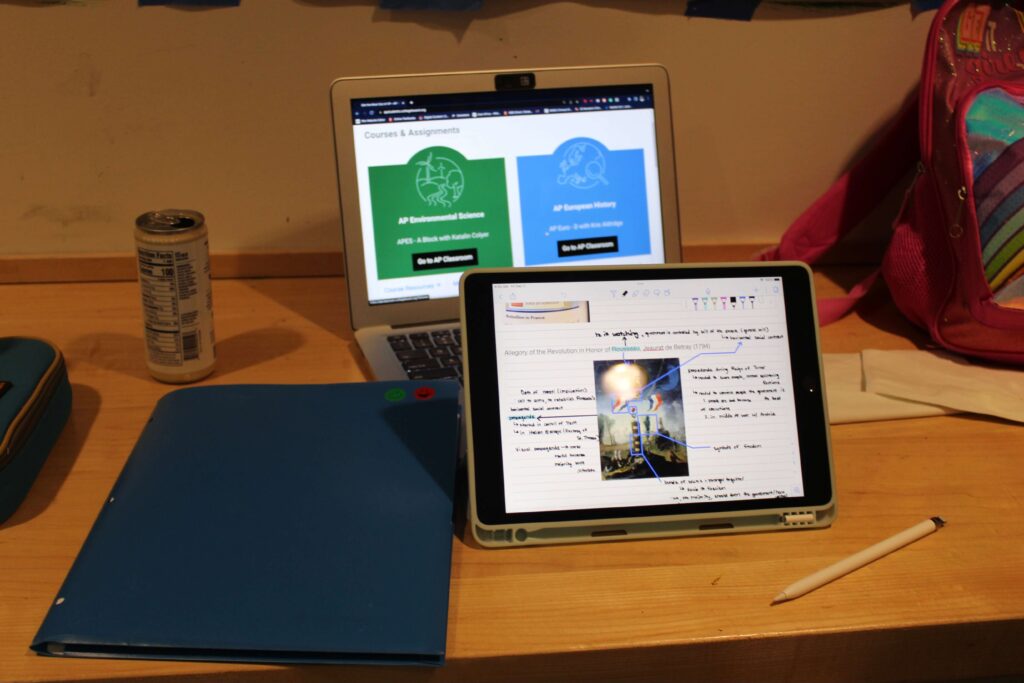Emi Enakhimion ‘24
Introduction:
Like many students across the United States focused on taking academically rigorous courses and scoring well on AP examinations, EA students are subject to “AP Culture.” AP Culture includes taking certain courses solely for the purpose of college admission rather than for authentic interest. Every AP class, including topics ranging from French to Studio Art to Physics C: Mechanics, culminates in a final exam at the end of the year where successful performance on the exam –– a score of three, four, or five on a five-point scale –– can lead to college credit and/or advanced standing in college. As a result, this creates an AP culture that excessively focuses on AP exam performance and pressures students to take certain courses simply to look more appealing to colleges. However, AP classes also offer insight into college classes and the difficulty that comes with higher education.
CONS:
While EA’s AP Culture inspires some students to pursue a more challenging course load, others feel that the pressure to take AP courses renders them unable to learn what truly interests them. AP Biology and Honors Anatomy teacher Jenn Jones states that “I greatly enjoy teaching the AP Biology curriculum but not as much the aspect of teaching to an AP test.” While AP material contains interesting information for some, solely learning material for the purpose to score well on a test can be mundane.
While students should think about their futures beyond high school, they should not feel forced to take a particular course just to impress colleges. Logan Schlitt ’23 says, “It was expected that I had to take an AP science and I wanted to drop it because it was hard, but I was told I had to replace that AP with another AP course rather than an Honors course. I didn’t realize there was a big difference between AP and Honors classes from a college standpoint.” Despite this pressure with EA’s AP Culture, Schlitt decided to continue with an Honors course. Schlitt explains, “Honors classes have more flexibility with the curriculum, and you get to engage more. The AP [curriculum] feels like you are just spitting out information, and it’s just as difficult.”
In terms of college admissions, students may only take certain classes to appeal to selective universities. Connor Shanahan ‘24 says, “You have kids abusing the system of learning and instead of fueling their passions, they are fueling their college aspirations, which takes away value from the whole experience.”
If teachers are pressured to prepare their students to succeed on the test to place out of college classes, there is less time for their input on the material. Sarah Taylor ’24 elaborates by saying, “It would be better for me if we could study topics that the teacher and students found interesting instead of constantly working towards a 5 on the test.” With the pressure to take AP courses, students may miss out on opportunities to focus on topics interesting to them.
Feeling obligated to take as many challenging courses as their schedule permits, it is possible for students to overfill their plate with what they can’t handle. Velina Feuzeu ’24 comments on the detrimental nature APs can have, stating that, “[AP Culture] makes people feel like they have to work hard and give up self-care, sleep, and taking care of themselves just to really work hard for school. I would say it’s really energy-consuming, but I guess for some students it’s worth it at the end of the year.” Students should prioritize their wellbeing and should not feel they have to compromise their physical and mental health to submit to AP Culture.

PROS:
By encouraging students to take many difficult courses, AP Culture at EA inspires students to challenge themselves. Especially with standardized testing becoming optional for more universities, AP courses provide an opportunity for students to show their knowledge by taking higher-level courses. Upper School History Teacher Michael Whalen states, “If you just look at AP US history, APUSH is a much more challenging class than regular US history. I think people who are passionate about history in general and want to go more in depth into the study of our own country’s history, I think AP makes sense.” Daniel Demessie ’24 recognizes the beneficial impact AP classes have had on his academic experience, adding,“I like the fact that AP classes are extremely rigorous and give me the opportunity to distinguish myself from other students.”
While students often blame the difficulty of the AP courseload on stress levels and AP culture, it is the students’ own doing for enrolling in the class. Whalen explains, “The underlying cause is that people as a whole at EA don’t recognize the value of learning and just value their GPA.” In order to change AP culture, the EA community must change it’s fundamental values, prioritizing true passion rather than passing with a good grade.
As juniors and seniors prepare for college applications, taking AP courses offers students the chance to stand out amongst their peers. Since AP courses are modeled after college-level classes,, students can also get a feel for the level of difficulty present in college. Michelle Jiang ’24 says, “AP classes are extremely challenging but they help me feel prepared for college. The pacing is a lot faster and it feels like a college course.” The AP curriculum also allows students to pursue higher education in topics that interest them. Gaeli Keffer- Scharpf ’23 adds, “I’m treating EA as a college prep school. I feel like if you aren’t looking to be pushed and challenged, maybe even pushed a little too much, then EA is not the school for you.” In other words, the AP Culture at EA helps characterize EA’s reputation as a rigorous school.